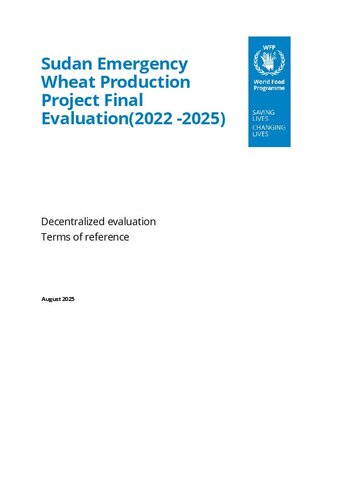
With a budget of USD 76 million from AfDB and USD 3.2 million co-financing from WFP, the project spans from November 2022 to December 2025 and targets smallholder farmers across five key wheat-producing regions: Gezira, New Halfa, White Nile, River Nile, and Northern States.
Subject and scope
The evaluation will assess the full implementation period of SEWPP, focusing on both input distribution (certified seeds, fertilizers, machinery) and technical assistance provided to smallholder farmers. Special emphasis is placed on gender equity and inclusion, with disaggregated data collection to evaluate differential impacts. The scope includes geographic coverage across all five regions, with a concentrated focus on Northern and River Nile States during the final season due to conflict-related access constraints.
Objectives and rationale
The evaluation serves dual purposes: accountability and learning. It will determine whether SEWPP achieved its intended outcomes - such as increased wheat production and improved food security—and explore how and why those results materialized or fell short. The rationale is driven by AfDB’s requirement for a final evaluation to inform future investments and guide the design of SEWPP Phase II. A standalone lesson learned report will be produced to synthesize best practices and operational insights for replication and scale-up.
Key evaluation questions
Seven core questions guide the evaluation, aligned with OECD-DAC criteria:
- Relevance: Did SEWPP align with the needs of smallholder farmers and national priorities?
- Effectiveness: Were intended outcomes achieved, and what unintended effects emerged?
- Efficiency: Were resources used optimally, and were inputs delivered on time?
- Coherence: How well did SEWPP complement other agricultural initiatives?
- Impact: What changes occurred in farmers’ economic status and food security?
- Connectedness: Did the project address conflict sensitivity and climate resilience?
- Sustainability: Will benefits and systems endure post-project?
Methodology
A mixed-methods, theory-based approach will be employed, integrating quantitative surveys, qualitative interviews, and focus group discussions across all target regions. Data will be triangulated from diverse sources, including monitoring reports, stakeholder testimonies, and direct field observations. Gender and inclusion dimensions will be embedded throughout the evaluation design, with ethical safeguards and participatory practices ensuring impartiality and stakeholder ownership. A detailed evaluation matrix will guide sampling, tool development, and analysis.
Users and stakeholders
Primary users include WFP Sudan, AfDB, and the Government of Sudan (Ministries of Finance and Agriculture), alongside beneficiaries (smallholder farmers), cooperating partners, private sector actors, and UN agencies like FAO. The evaluation will also inform broader policy dialogues and institutional learning across Sudan’s agricultural sector. Accountability to affected populations is emphasized, with inclusive stakeholder engagement and gender-sensitive consultation processes.
